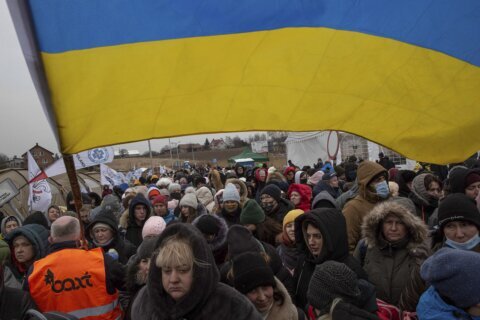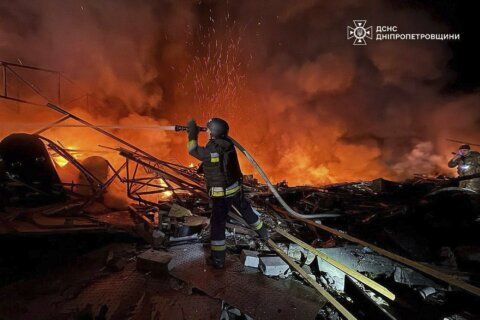DOVHENKE, Ukraine (AP) — Yukov says the same thing to all the mothers. He tells them to talk about their dead children, so they will be remembered. There is one person in particular whose story Yukov does not want forgotten: Oleksandr Romanovych Hrysiuk — Sasha, to his mother, Olha.
In a cryptic voice message last year, Yukov urged Olha to tell Sasha’s story. “Not everyone has such a story,” he told her.
But he left out the most important part: What it had cost him to bring Sasha home.
The true toll of the war in Ukraine — and the odds faced by each side — can be measured in bodies. The question of who prevails now is being increasingly shaped by which side can tolerate higher losses. By that measure, Moscow has the upper hand.
Analysts say it will be hard for Ukraine to outmatch Russian forces, which continue to grow despite hundreds of thousands of casualties, without significant resources from its international partners. Russia had 3.7 times more men of fighting age than Ukraine in 2022, according to World Bank data. That means that though Russia has sustained nearly twice as many casualties as Ukraine, according to Western intelligence estimates, on a per capita basis Russia’s losses remain lower than Ukraine’s.
“Putin is not running a democracy,” said Evelyn Farkas, a former senior Pentagon official for Russia and Ukraine who now heads the McCain Institute at Arizona State University. “Putin can afford to be more callous and disregard the body count.”
Yukov understands that for people far away, war is geopolitics, death can be counted in numbers, and money matters more than men. But he knows better.
“War has one face,” he said. “Death and stupidity and horror.”
Sasha, 27 years old, lasted exactly six weeks at war. Soldiers from his unit told his family they were sorry they couldn’t take his body with them, the shelling was too heavy, all they could do was hide his body in a cellar in Dovhenke, a rural settlement in eastern Ukraine. They would write his name on the shells they fired because they loved him too.
It was time for Sasha to come home. But how?
Olha said she asked everywhere for help: the Ukrainian Red Cross, the International Committee of the Red Cross, Ukraine’s National Information Bureau, the Ukrainian military, the Coordination Headquarters for the Treatment of Prisoners of War, the Commissioner for Human Rights, hotlines and volunteer groups, the Ministry of Defense, even Ukrainian President Volodymyr Zelenskyy himself.
In the end, people told her that if Black Tulip couldn’t bring Sasha home, no one could.
Black Tulip is the name of the network of volunteer body collectors Yukov worked with back in 2014, when Russia seized Crimea and pushed into eastern Ukraine. Black Tulip has since disbanded but the name stuck. Yukov went on to found his own group, called Platsdarm, to continue the mission.
Yukov got to Dovhenke in September 2022, not long after the Russians left. More than 90 percent of buildings there had been destroyed or damaged, and it was hard to find the cellar where Sasha’s unit said they’d left him. Also, there were mines.
On the third day of searching, Yukov took a step and heard a click. The force of the explosion knocked him to the ground.
“I was laying there and I felt like I had no legs,” Yukov said. “I was like, ‘It’s fine, I’ll get a prosthesis.’ . . . But I saw holes and blood spraying from my legs. I was like, ‘OK. Legs are in place.’ But suddenly, I can’t see with my eye. There’s no eye.”
Within weeks, Yukov had a new glass eye and was back in Dovhenke, searching for Sasha. A small grey kitten with an injured nose kept jumping on his shoulder, nuzzling him. The cat circled one spot in the wreckage, so they started digging there.
“Souls come over and wander next to us,” Yukov explained. “A sign came to show us where he was lying … He wants to be back home. Mother is waiting.”
By the time they’d pried through the last layers of concrete, it was dark. Denys Sosnenko, a 21-year-old who Yukov used to coach at kickboxing, went down in the pit to comb the dirt with his fingers, looking for bones.
Yukov told Denys to try to keep the fragments of Sasha’s head together in what was left of his helmet. It was hard to keep track of all the pieces of Sasha because it was pitch black and they were working by flashlight.
Denys pulled out the backbone and pelvis, a shoulder blade, an elbow and a silver, soil-caked cross. Yukov gathered everything carefully in a large white bag.
Two months later, Denys drove over a landmine and died.
Olha hoped for a long time that missing meant alive. But when Yukov sent a photograph of the necklace they’d found in the cellar in Dovhenke, Olha recognized it instantly. It was the same silver Jesus she’d given Sasha when he left for war.
Yukov is a destroyer of hope for mothers. But they thank him anyway.
“I am glad we managed to do it,” Yukov messaged Olha, after he found Sasha. “We are holding the sky together with you.”
“Your work is priceless,” she replied.
Yukov never told Olha he’d lost an eye trying to find her son.
When she heard what had happened, she nodded faintly, her frown deepening to an expression of infinite sadness.
“I cannot express with words how grateful I am,” she said. “As long as I live, I will remember the sacrifice he made for me and my family.”
Olha visits Sasha’s grave every day, to talk with him and pray that he — and perhaps she herself — finds peace.
“I know Sasha wanted to come home,” Olha said. “Sometimes I watch TV, the internet, TikTok, whatever, and I think: That’s it, we lost. I feel like giving up … But when I watch videos of Oleksii (Yukov), I want to keep helping. If there are people like Oleksii, nothing is lost yet in Ukraine.”
___
AP reporters Michael Biesecker in Washington DC and Volodymyr Yurchuk and Vasilisa Stepanenko in Ukraine contributed to this report.
Copyright © 2025 The Associated Press. All rights reserved. This material may not be published, broadcast, written or redistributed.









